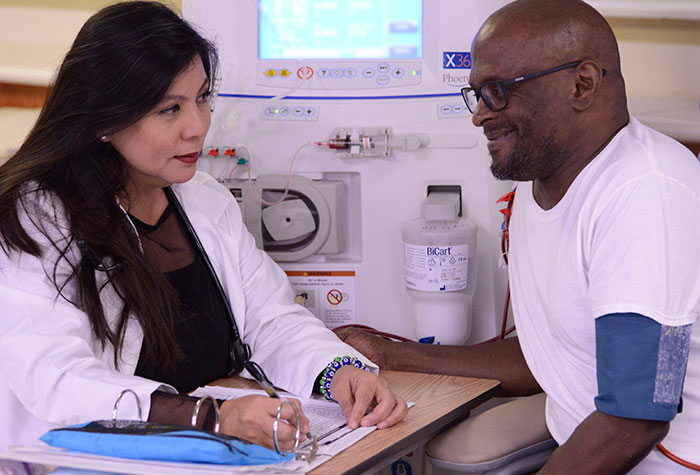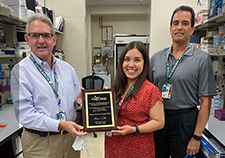Office of Research & Development |
 |


Dr. Adriana M. Hung, a coauthor on the new blood pressure study, meets with patient Rodney Stewart at the Tennessee Valley Healthcare System. (Photo by Brandon Lunday)
February 6, 2019
By Tristan Horrom
VA Research Communications
A large, international genetic study using Million Veteran Program data has identified more than 200 gene variants that could contribute to high blood pressure. The study also identified over 200 drugs currently used to treat other diseases that could potentially be repurposed to treat high blood pressure.
"We're redrawing the map of blood pressure genetics."
Dr. Todd Edwards of the VA Tennessee Valley Healthcare System—one of the senior authors on the study and himself a Veteran—explained the significance of the findings. “We’re redrawing the map of blood pressure genetics,” he said in a Vanderbilt University press release.
Nearly 100 researchers from around the world collaborated on the study, including 24 VA researchers. The results appeared in the January 2019 issue of the journal Nature Genetics.

VA Study Documents Health Risks for Burn Pit Exposures

VA center training the next generation of researchers in blood clots and inflammation

Could cholesterol medicine reduce dementia risk in seniors?

VA investigator brings diversity into autoimmune disease research
Each person has different variations of genes at specific locations on their genome. These variations are mostly inherited. The idea behind genome-wide association studies such as this one is that people who share the same gene variants could have similar risks for diseases.
While lifestyle choices—such as smoking, diet, and alcohol use—influence the risk of high blood pressure, doctors have known for some time that a significant part of a person’s risk comes from the genes inherited from parents.
Previous genome studies reported more than 250 genome locations that affect blood pressure. In this study, the researchers identified 201 new locations on the genome that affect blood pressure. They also identified 304 locations that had been identified by previous studies.
They found these new gene associations by looking at the genomes and blood pressure data of more than 300,000 Veterans who participate in MVP, along with more than 140,000 participants from the UK Biobank. By comparing genomes across this large participant group, the researchers identified the gene variants shared by those with high blood pressure.
Once they had identified the new gene locations, the researchers compared their results with the genomes of more than 300,000 participants from the International Consortium for Blood Pressure and Vanderbilt University’s BioVU. The comparison confirmed the findings from the MVP data.
Beyond identifying new gene locations affecting blood pressure, the study yielded several other interesting results. Once the researchers had identified genome locations related to blood pressure, they cross-checked those genes against a list of genes targeted by drugs used to treat diseases other than hypertension. This analysis pointed to over 200 drugs that interact with the identified genes, meaning that those drugs could potentially be repurposed for treatment of high blood pressure. The study also identified 40 new genes that could be the focus of new drug development to treat high blood pressure.
The researchers also compared the genetic effects on blood pressure between black, white, and Hispanic Veterans in the MVP database. They found that the effects of gene variations were similar among ethnic groups.
Another phase of the study focused on the genetic underpinning of kidney function. The kidney is an important organ for blood pressure regulation. The researchers looked at gene expression in mouse kidney cells to identify which cell types are most involved in regulating blood pressure. They found that structures in the kidney called tubules are the most important for blood pressure. Genes identified by the study were most expressed in tubule cells.
Finally, the researchers used the new genomic data obtained in the study to create a score for predicting high blood pressure in patients. The score counts the number of gene variants related to high blood pressure that are present in an individual patient’s genome. The higher the score, the greater the genetically predicted burden of high blood pressure for a given individual. The researchers checked these scores against the electronic medical records of over 250,000 Veterans. On average, individuals with higher scores were more likely to have high blood pressure, as well as kidney disease, stroke, complications related to diabetes, and aortic aneurysms, as well as a number of other conditions.
Edwards acknowledges that more research is needed to understand how genes affect blood pressure, but he asserts these findings may help advance treatment. “We can’t accurately say what your blood pressure’s going to be at age 65 by looking at your genotype, but we might be able to tailor your treatment a little more accurately with some of the results we have from this study,” he says.
High blood pressure is the leading cause of death and disability in the United States and around the world. According to the National Institute of Aging, more than 60 percent of people over 65 have high blood pressure, and the number of people with high blood pressure is increasing. High blood pressure is the largest inheritable factor for stroke and coronary artery disease. It is responsible for 13 percent of deaths worldwide.
MVP is a national, voluntary research program funded by VA’s Office of Research and Development. MVP partners with Veterans receiving care in the Veterans Health Administration to study how genes affect health. As of January 2019, MVP had enrolled more than 725,000 Veterans. It is already one of the world’s largest databases of health and genomic information.
VA Research Currents archives || Sign up for VA Research updates